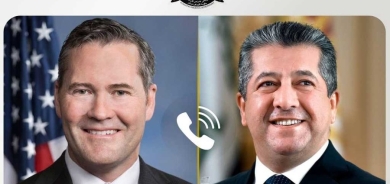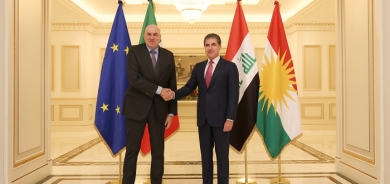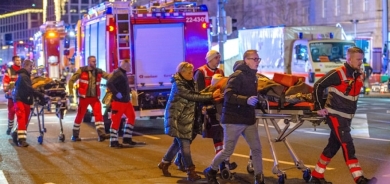Abu Bakarr Bah to gulan: I think the better way to go is actually have a free, fair, open elections, and whoever win will be in a sense reflecting the will of the people
November 16, 2011
Exclusive Interviews

Abu Bakarr Bah is Associated Professor in the Department of Sociology at Northern Illinois University, and he is the Editor-in-Chief of African Conflict and Peacebuilding Review (ACPR) since 2010 to present day.We have contact the Professor Bah to take his views and opinions regarding to the current situations, democracy, and the role of the International Community regarding to the revolutions happen in the Middle East, and he responded to Gulan Magazine in an exclusive interview as the following:* The recent changes in the Middle East after “The Arab Spring” is leading to Islam Spring, since following Tunisia, there are expectations for the Egyptian Elections that the Islamic political parties may also come to power in Egypt. Our question is; according to your opinion, to what extent do you think that the Islamic political parties can lead the situation towards democracy? Or; do you think that they will endanger these achievements?
- That’s actually a very interesting question. I think you can think of some historical cases, the one that comes to my mind first is in Algeria back in the 1990s I believe, when Islamists won in Algeria and they canceled the elections and led to violence and so forth. Another historical case that comes to my mind is; Nazi Germany he came to power, you can say through some kind of democratic process, but when he came in he tried to undermine it. So I think what you point in this question here really is, of course it is the fundamental question and that is to say; whether Islamists will actually be willing to play by the rules by which they gain power. In other words; whether are they actually promote democracy or democracy will be actually a mean for them to undo democracy’s existence. I think two things are very important, first: Islam and Islamic parties are not necessarily incomparable with democracy, you can still have Muslims, you can still have Islamic parties, and you can still have democracy, I think Turkey is a very good example in that sense. Secondly; I think if we go with the assumption that, if the Islamists come to power and they undermine the system, that’s actually still as a speculation. So; in a sense it is not in the nature of democracy to say that “you will not participate because if you come you will undermine democracy”, I think we can only make that if that has actually happened. I think the better way to go is actually have a free, fair, open elections, and whoever win will be in a sense reflecting the will of the people, and I think if the Islamists came through democracy it would not be in their interests to actually undermine it, because then they will be in war with everybody. So; I will actually want to take a chance with them, as long as the elections are free and fair, and that is what the people want. It is also important to note that religion plays a role in all countries; people are tied to their religion. So; I think we can not really say that if you have a country in which 70 – to %80 of people are Muslims you can not have an Islamic party, I think it is unreasonable to assume that people will not vote for that. In the United States, Christians vote for candidates and people who actually hold strong Christian views.
* To what extent do you think that the Islamic political parties in the Arab countries will be able to imitate the Turkish model? Because there is a hope that the Islamic political parties like in Turkey, may produce democracy.
- I think if one goes with the assumption that the Islamic parties actually are using democracy as a tool to gain power, I think one have to take risks and democracy is about risks, I can not say for sure that it will end up like the Turkish parties, like Turkey. But I think the real problem is that if you try to actually prevent them now at the risks in creating bigger problems, and again it is what we saw in Algeria, and again it will be countered to the logic of democracy. So in a sense, until it is proved otherwise, I think it would be difficult to say that they will undermine the system. And gain, this is a chance, like all of the elected people you take a chance, I mean the elected people can do good things and may do bad things; they can be Islamists or non-Islamists.
* Libya and Syria are two different cases; The NATO Forces were able to topple Gaddafi’s Regime in Libya, but there no any International Community efforts towards Syria in this regard. Do you think that the International Community will continue keeping silence towards Syria?
- Potentially; Syria is one of the more difficult challenges for the international community in number of ways. Let’s speak about what happened in the past 10 – 20 years, on one hand; you have cases of great international failures related to morality, cases where the international community sat down and many people were killed, in Rwanda for example, during the genocide. You take for example what actually happened in Liberia and Sierra Leone for a very long time before the international community intervened. So I guess we do have scenarios in which the international community has actually seen disasters but it hasn’t actually done more, and to some degree you can see Yugoslavia was in that category. Then we do have other scenarios in which the international community somehow took some bold actions, whether that to do with politics or not, for example in Bosnia there was big intervention and you can see that genocide was kind of avoided. If you look at Libya, it is a very good example, again; if one assumes or agrees that The Gaddafi was going to kill thousands and thousands of people, then you do have international actions to prevent that. The international community is always caught between two situations, one is; it sits idly and humanity tragedy happens and it causes a lot of troubles, and secondly; it intervenes, and when intervenes it sometimes be successful, you can say in Libya, sometimes it causes a lot of problems as Iraq and Afghanistan.
* The United States is withdrawing from Iraq during the current complex situations in the Middle East, there are high risks of Iraq’s situation to fall apart completely or to return back to dictatorship. How far do you think that the withdrawal of the US Forces endangers the future of Iraq?
- The invasion of Iraq has always been problematic, domestically and internationally. I think the real question now is; whether the US withdrawal will actually end the military intervention, or will actually have a significant continuous engagement with Iraq, something distant from combat or kind of military operations. So; I think if the US actually continues to be engaged in Iraq, and continues to provide support, especially to the civil society, continues to somehow try to build trust with the Iraqi people, that if the intention is not so much about oil and US interests, and do wider mission of promoting freedom in the Middle East. I think if we have that kind of significant engagement, possibly it can stall the potential damage from the US withdrawal. In all issues of social transformations, in all issues of revolutions, and in all issues of changing the country; I think ultimately it is the Iraqi people that can eventually really ensure that Iraq does not go back to Saddam Hussein’s kind of dictatorship. If I was going to put a bet, I would put more bet in civil society, in trying to build institutions that actually promote inclusions, not exclusion. So; the more you can design Iraq’s institutions to include everybody in the country, the more you can actually ensure the civil engagement in politics, and I think the better Iraq would be. The United States actually exhausted its abilities in Iraq; I mean it has done as much as it can, so you can get the results by yourselves.
* Last Question: in your views; how do you interpret the changes in the Arab countries? In other words; how far do you believe that the democratic political parties will handover the situation and build democracy in this area? Do you think that; if democracy will be produced in the Middle East, in particular in Iraq?
- Democracy means a lot of things. Sometimes when we talk of democracy, we talk of it as the kind of an ideal society, the society in which everybody is free politically, and to some degree free from poverty. I think it is true that democratic system will produce such kinds of things, but over time, over the long run. I think the most useful way to think of democracy – in much more narrower sense – in the sense that if we build a political system that is actually based on accountability to the people, I guess over time we can actually increase more democracy, more rights, more liberty, more freedoms and so forth. So; you don’t gain democracy at once; but you build it, and you begin by the mechanisms of an accountable government, and if you keep on doing that it will hopefully generate more and more systems of rights and accountability and so forth. So; I think it is possible to build democracy in the Middle East, based on the will of the people in the Middle East. In my mind I think the people of the Middle East are just like any other human beings, I mean; we all want freedom, we all want dignity and these sorts of things. So; I don’t think that democracy is incomparable with any system or any culture. Democracy is about institutions, it is about mechanisms, and I think it is very important that in designing it, it reflects the culture and the history of the people. I put a lot of emphasis on design, it is not just about holding elections, but is about how you design the elections. For example; how many parties are allowed to compete?
The Arab Spring and the revolutions in the Middle East are very interesting, and I think I have a little bit pessimistic kind of view; because it seems to me that the revolutions are actually about economic issues, they are about jobs, people are dissatisfied with a particular leader, they are dissatisfied with economic conditions, and they are dissatisfied with social justice, I don’t actually see it as a revolution that dealt upon long term desires or ideas for a free and open democratic kind of society that respect individuals’ rights. If we compare it with revolutions in the Eastern Europe, people in the Eastern Europe wanted job and wanted to be like the West. I think when the revolution is about ideals, it is far much more sustainable. If you have a revolution that is much more focused on issues and concrete conditions, it is much easier for once changing in the leadership to another leadership come, it is very easy to actually forget about what the real issues are. I am a little bit skeptical, I am thinking that – I hope it doesn’t happen – I am having the feeling that many of these regimes; in Egypt or Libya and so forth, be very much similar to the ones that been replaced, I hope it doesn’t happen, but the way to prevent that is that the leaders of the revolution and the young people can redirect again the focus of the struggle as far as so much on the economic issues or jobs, and to make it really a struggle for some basic ideas, in the long run I think it is much more visible to sustain the gains of the revolution, but I think at the begins of the revolution it can be lost very easily when a new group of leaders come and do the same old things.
Transcription: Qane’ Kakeiy















